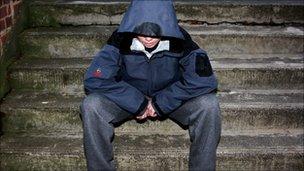Schools excluding pupils illegally, report says
- Published

The government said pupils taken out of mainstream education deserved better
Some schools in England are "acting illegally or unscrupulously" by excluding pupils by unofficial means,a Centre for Social Justice report, externalsays.
Some schools encourage parents to remove difficult children, avoiding officially excluding them but providing no support, the think tank report says.
It also calls for benefit cuts for parents who refuse all help with disruptive children.
The government said it was working to improve education for excluded pupils.
The report, No Excuses: A review of educational exclusion, is based on interviews with more than 100 heads, teachers, parents, pupils, local authority, voluntary and private sector workers, academics and other professionals.
It calls for more transparency in the area of school exclusions, saying official figures do not provide an accurate picture of exclusions in some schools.
Schools can transfer or swap pupils into alternative provision such as pupil referral units (PRUs) and vocational training without officially excluding them, it says.
Some schools are "failing to comply with their legal obligations" or are "carrying out unofficial illegal exclusions", the CSJ says. It outlined practices which include:
Encouraging parents to withdraw their children from school voluntarily with a warning that the child would otherwise be permanently excluded, when a school with evidence for excluding a child has an obligation to pursue formal exclusion
Using part-time schooling arrangements - allowed for children who have been ill or those returning after exclusion - as an alternative to permanent exclusion, when they are meant to be just a short-term measure
Sending pupils out of school for a "cooling off" period, rather than using a formal short-term exclusion, when statutory guidance states this is illegal
Using a school's powers to refer a pupil to other provision, such as off-site vocational training, as an alternative to exclusion, when the guidance says it should not be used for this purpose
"Some schools are taking an 'out of sight out of mind' approach to challenging pupils, and getting their behaviour ''off their hands", the report says.
The number of permanent exclusions has dropped in recent years, from 12,300 in 1997-8 to 5,740 in 2009-10, and the number of suspensions (fixed-term exclusions) have also dropped.
But the number of pupils educated in PRUs - units for pupils for whom mainstream education is not considered suitable - almost doubled between 1997 and 2007, the report points out.
"Although the number of permanent exclusions appears to be reducing, it is impossible to be clear of progress, given the uncertainty about the level of unofficial exclusions being used," the CSJ says.
The report also recommends sanctions such as cuts to welfare or child benefit payments for use against parents who refuse all help offered by schools to tackle problem pupils.
CSJ chief executive Gavin Poole said: "In some cases there is a core of parents simply refusing to engage with the school and in their child's education.
"Parents have to face up to the responsibility of parenting."
Last week, Prime Minister David Cameron said that the government was considering cutting benefits for parents of pupils who played truant persistently.
'Staggering'
The CSJ also warned of a "climate of fear gripping many pupils who feel unsafe in school".
Its researchers were told of cases where children as young as seven had been found carrying knives to school.
"Often the children said that they had brought the knives in because they were being bullied in school, to scare someone, or because they were being bullied by older children or, in one example, by someone's father, on their way home from school," the CSJ said.
"The extent to which pupils in some of our schools are feeling unsafe and the impact that weapon-carrying street gang activity and conflict is having on their behaviour is staggering."
The CSJ, however, also praised the work of some schools in providing disruptive pupils with extra support.
It said it had found shocking accounts of abuse and neglect which lead to poor behaviour and called for a shift towards early intervention to help students before their problems became serious.
The need was evident in the "tragic fact" of children excluded at an early age - for example, 320 children below the age of eight were permanently excluded from school in 2009-10, it said.
The report also welcomed government plans to pilot a system where schools are responsible for the funding and commissioning of provision for excluded pupils, and for their exam results.
But it warned that if targets for reducing exclusions were maintained, the system could inadvertently fuel unofficial exclusions.
Accountability
The CSJ was founded by Iain Duncan-Smith, now Conservative Work and Pensions Secretary, and counts Labour figures such as Frank Field and David Blunkett, as well as Tories including William Hague on its advisory council.
Schools Minister Nick Gibb said: "We know that children who need to be taken out of mainstream schools are not getting the education they deserve."
He said the government was increasing the autonomy, accountability and diversity of alternative provision to help drive up standards.
Good or outstanding PRUs would be able to apply to become academies, operating outside local authority control, while schools would be given more power and responsibility to provide for excluded pupils, he said.
Mr Gove said early this month that far too few PRUs met the required standard, and said he had commissioned an adviser to explore how provision could be improved.
However, Russell Hobby, secretary general of the National Association of Head Teachers, said the study was mistaken in criticising the use of alternative provision before exclusion.
"In fact, this is essential, and getting a child with difficulties the swift specialist support they need can prevent exclusion and assist re-integration into the mainstream," he said.
- Published9 September 2011
- Published1 September 2011
- Published15 August 2011